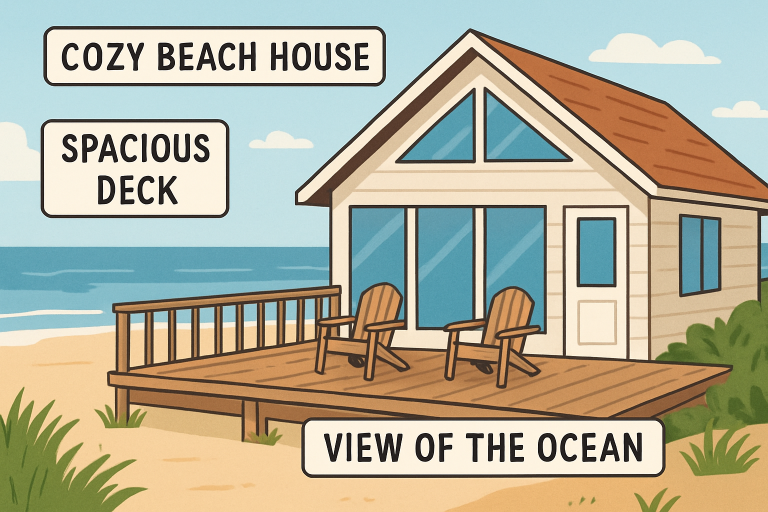Key Takeaways
- Define your lifestyle priorities to guide your beach house selection.
- Assess the property’s location, amenities, and structural integrity.
- Understand the financial implications, including maintenance and insurance costs.
Owning a beach house is a cherished dream for many, evoking visions of sunlit mornings, soothing ocean waves, and ultimate relaxation. But while the fantasy is alluring, finding the right property demands attention to your unique needs and thoughtful research. Whether your vision involves an active seaside community, uninterrupted views, or a lucrative investment property, having access to comprehensive listings—such as those available for Fort Lauderdale Beach Homes for Sale—can help you match your aspirations with real-world options. In this guide, you’ll learn how to navigate the decision-making process and secure a beach house that truly complements your chosen lifestyle.
Each beachside community and property has distinct characteristics, so aligning your choices with your personal priorities—while considering practical variables like location, features, and maintenance—will help transform your dream into reality.
Define Your Lifestyle Priorities
Before making any property visits or reviewing listings, take the time to reflect on what you truly want from your beach house. Are you drawn to quiet solitude and privacy—or do you envision hosting gatherings with friends and extended family? Some buyers seek a retreat for relaxation, while others prioritize social opportunities, vibrant nightlife, or the potential for rental income. Factoring in these priorities from the start, such as being close to watersports amenities or family-friendly beaches, narrows your options and prevents future disappointment.
Evaluate the Location
The location of your future beach home is arguably the most critical factor in your long-term enjoyment. Start by evaluating proximity to essentials: grocery stores, healthcare, schools, and entertainment. Also, consider climate patterns, the quality of nearby beaches, and accessibility for both daily life and guests. Coastal regions can have unique risk factors—such as susceptibility to hurricanes or erosion—which emphasizes the need for diligent local research. Take time to visit short-listed areas during different seasons to get a true feel for the environment and local culture before making a decision.
Assess Property Features and Layout
Beach homes often celebrate natural light and open layouts, but your preferences should take center stage when selecting essential features. Homes with floor-to-ceiling windows or expansive decks maximize ocean views, while covered porches allow year-round enjoyment of the outdoors. Determine how many bedrooms and bathrooms you’ll need, keeping in mind future guests or potential renters. Open kitchens and versatile living areas can make entertaining easier, while private nooks and balconies offer ideal places to unwind. Outdoor amenities, such as secure storage for water equipment, outdoor showers, and shaded seating, enhance coastal living.

Consider Construction Quality and Materials
Beachfront and coastal homes are exposed to more challenging conditions than most inland properties. Salt air, humidity, powerful winds, and even intermittent flooding are all realities to account for. When touring homes, look for the use of resilient materials such as stainless steel fixtures, treated lumber, and weather-resistant siding. Impact-resistant windows and durable roofing can protect against storms and minimize maintenance costs over time. If you’re leaning towards renovating or building from scratch, consult with local contractors familiar with coastal construction standards to ensure lasting value.
Understand Financial Implications
Budgets for beach homes should include more than just the purchase price. Anticipate higher maintenance expenses, as coastal exposure can accelerate wear on paint, exteriors, decks, and HVAC systems. Insurance rates may also be above average—especially in areas designated as hurricane or flood zones. Research what is required for flood and windstorm insurance and consult with local experts or financial advisors to understand all ownership costs, including HOA fees, utility costs, and property taxes. This step ensures your investment is sustainable and minimizes surprises down the line.
Research Local Regulations and Restrictions
Coastal communities often enforce specific regulations to safeguard local ecosystems, manage development, and reduce the impact of natural hazards. Familiarize yourself with local zoning laws, setback requirements, and building codes, which could influence renovation projects or expansion plans. Some properties have restrictions on short-term rentals or usage that may impact your ability to generate income or host events. Reach out to municipal office websites and homeowners associations to request documentation and clarify any ambiguities before moving forward.
Work with Experienced Professionals
Navigating the nuances of coastal property is best done with expert guidance. Search for real estate agents with a proven track record in beach properties, as they’ll understand local market trends, unique financing scenarios, and seasonal demand fluctuations. Experienced agents can help identify hidden gems, avoid problem properties, and negotiate favorable terms on your behalf. They can also connect you with inspectors, contractors, and insurance agents familiar with the specific risks and benefits that come with beach house ownership.
Conduct Thorough Inspections
Before closing, invest in comprehensive inspections carried out by professionals who specialize in coastal environments. Inspect not only the interior and visible elements but also the foundation, drainage systems, and the potential for erosion or land movement. Check for signs of past water intrusion, mold, or termite damage, as these can be more common near the ocean. A thorough inspection, including soil stability testing and assessment of flood preparedness, protects your investment and provides peace of mind for the future.
By prioritizing your lifestyle needs, carefully evaluating properties, and relying on expert local insight, you can confidently select a beach house that’s the right fit—creating an enduring getaway or income-generating asset that you’ll enjoy for years to come.
YOU MAY ALSO LIKE: How Floor Refinishing Can Revitalize Your Home











